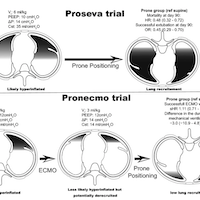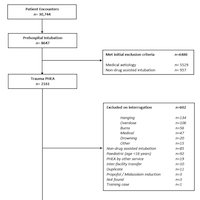Tag: ventilation
COVID-19 ARDS Patients vs. Patients with ARDS
Ventilation management may differ between COVID–19 ARDS (COVID–ARDS) patients and patients with pre–COVID ARDS (CLASSIC–ARDS); it is uncertain whether associations of ventilation management with outcomes for CLASSIC–ARDS... read more
Tracheal Intubation in Critically Ill Adults with a Physiologically Difficult Airway
Using a Delphi method, agreement among a panel of international experts was reached for 53 statements providing guidance to clinicians worldwide on safe tracheal intubation practices in patients with a physiologically difficult... read more
Ultrafast Cooling With Total Liquid Ventilation Mitigates Early Inflammatory Response
Ultrafast cooling with TLV mitigates neuroinflammation and attenuates acute brain lesions in the early phase following resuscitation in large animals subjected to cardiac arrest (CA). Brain injury is one of the most serious... read more
Pitfalls in the Management of Mechanical Ventilation: ARDS and Hypermetabolic States
Mechanical Ventilation (MV) is an invaluable, lifesaving therapy for patients with acute respiratory failure, but it must be individualized for each specific underlying physiologic derangement to maximize benefits and minimize... read more
Antifungal Prophylaxis of COVID-19 Associated Pulmonary Aspergillosis in Ventilated Patients
This study investigated the impact of POSA prophylaxis on risk of CAPA development in mechanically ventilated COVID-19 patients receiving corticosteroids. We observed a significant variation in CAPA incidence rates among... read more
High-flow Nasal Cannula Oxygen vs. NIV in AHF-related ARF
In this pilot study, we did not observe a statistically significant difference in changes in respiratory rate among patients with acute respiratory failure (ARF) due to acute heart failure (AHF) and managed with high-flow... read more
Weaning From Mechanical Ventilation in ICUs Across 50 Countries
Current management practices and outcomes in weaning from invasive mechanical ventilation are poorly understood. We aimed to describe the epidemiology, management, timings, risk for failure, and outcomes of weaning in patients... read more
Early In-Bed Cycle Ergometry in Mechanically Ventilated Patients
Among adults receiving mechanical ventilation in the ICU, adding early in-bed Cycling to usual physiotherapy did not improve physical function at 3 days after discharge from the ICU compared with Usual physiotherapy alone.... read more
Noninvasive Ventilation for Preoxygenation during Emergency Intubation
Among critically ill adults undergoing tracheal intubation, preoxygenation with noninvasive ventilation resulted in a lower incidence of hypoxemia during intubation than preoxygenation with an oxygen mask. Among the 1,301... read more
The role of pleural pressure and airway closure during mechanical ventilation
Related to our paper, Van Egmond et al. highlighted key physiological concepts we must be aware of. We believe, however, that the described physiological com-plexity has limited impact on the daily use of esophageal pressure... read more

Two weaning strategies for NIV in COPD patients with ARF
Non-Invasive Ventilation (NIV) is a crucial therapy for managing acute exacerbations of Chronic Obstructive Pulmonary Disease (COPD) with hypercapnic respiratory failure. Research has shown that NIV can decrease the rate... read more

Improving Spontaneous Breathing Trials With a Respiratory Therapist-Driven Protocol
This quality improvement (QI) project aimed to standardize and re-establish RT-driven protocol for screening patients for SBT readiness and administering SBTs to appropriate patients. Endotracheally intubated and mechanically... read more

Tezepelumab in a case of severe asthma exacerbation and influenza-pneumonia on VV-ECMO
We present a case of 43-year-old male patient with broadly by Omalizumab, Mepolizumab and Benralizumab pretreated allergic asthma, who suffered a near fatal exacerbation, triggered by an influenza A infection. Due to... read more

Prone Positioning During ECMO for Severe ARDS
The ongoing debate on optimal extracorporeal membrane oxygenation (ECMO) care emphasizes the need for rigorous investigation, acknowledging the value of observational data in routine The PRONECMO study, with its pragmatic... read more

COVID-19 Airway Management and Ventilation Strategy for Critically Ill Older Patients
This book describes the issues and challenges that clinicians encountered in the management of older critically ill patients during the COVID-19 pandemic, and offers practical information on how to manage them. Older... read more

Critical Hypertension in Trauma Patients Following Prehospital Emergency Anesthesia
Delivery of prehospital emergency anesthesia (PHEA) to seriously injured trauma patients risks hemodynamic fluctuation. In adult trauma patients undergoing PHEA, 11.9% of patients experienced post-PHEA critical hypertension.... read more

Intravenous Vitamin C for COVID-19 Patients
In hospitalized patients with COVID-19, vitamin C had low probability of improving the primary composite outcome of organ support–free days and hospital survival. Enrollment was terminated after statistical triggers... read more

Effect of Mechanical Ventilation Under Intubation on Respiratory Tract Change of Bacterial Count
Mechanical ventilation under intubation may cause dysregulation of lower respiratory microbiota in rats. The most common 'second strike' in mechanically ventilated patients is a pulmonary infection caused by the ease with... read more

Transnasal Humidified Rapid-Insufflation Ventilatory Exchange vs. Conventional Facemask Breathing for Preoxygenation During Rapid Sequence Induction
Transnasal humidified rapid-insufflation ventilatory exchange (THRIVE), if used for pre-oxygenation and apnoeic oxygenation, has the propensity to extend the safe apnoea time and thereby decrease the incidence of desaturation... read more

1-year Survival Rate of COVID-19 Infected Patients with ARDS Based on Ventilator Types
The study revealed that the utilization of non-ICU sophisticated ventilators was linked to a higher mortality rate when compared to standard ICU ventilators in COVID-19 patients with ARDS. However, given the shortage and... read more

Noninvasive Ventilation in Sleep Medicine and Pulmonary Critical Care
This book is an introduction to a comprehensive analysis of recent advances and clinical research in noninvasive mechanical ventilation (NIV) in Pulmonary, Critical Care, and Sleep Medicine. The objective of the book is to... read more

ReddyPort Non-Invasive Ventilation Device Cleared By FDA
ReddyPort announced today that the US Food and Drug Administration (FDA) granted 510(k) premarket clearance for the ReddyPort elbow device used in non-invasive ventilation (NIV). "ReddyPort's patented elbow is central... read more










